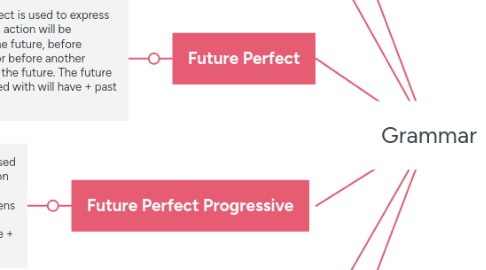Grammar
作者:Maha Alamri


1. Other,Others,and Another
1.1. -Other can be used as a adjective before a plural noun to mean "additional" or "further".
1.1.1. -Others can be used as a pronoun to mean additional or other persons or things.
1.1.1.1. -Another can be used as an adjective or a pronoun.
2. Used to,Be Used to
2.1. -Used to + the base form of a verb is used to talk about an activity that was repeated habitually in the past, but which is not done now.
2.1.1. -Be used to + gerund or noun is used to talk about something that has become familiar or habitual.
3. Future Perfect
3.1. The future perfect is used to express the idea that an action will be completed in the future, before another event or before another specific time in the future. The future perfect is formed with will have + past participle.
4. Future Perfect Progressive
4.1. The future perfect progressive is used to focus on the duration of an action that will be happening in the future before another time or event happens in the future. The future perfect progressive is formed with will have + been + present participle.
5. For and Since
5.1. -Use the present perfect simple tense with for to indicate the duration of the action: for two months, for a yea for a long time.
5.1.1. -Use the present perfect simple with since to indicate when the action began: since yesterday, since last June.
6. Simple Present VS Present Progressive
6.1. -Use the simple present tense to talk about habits and routines.
6.1.1. -Use the progressive present tense for verbs that happen now or in a temporary situation.
